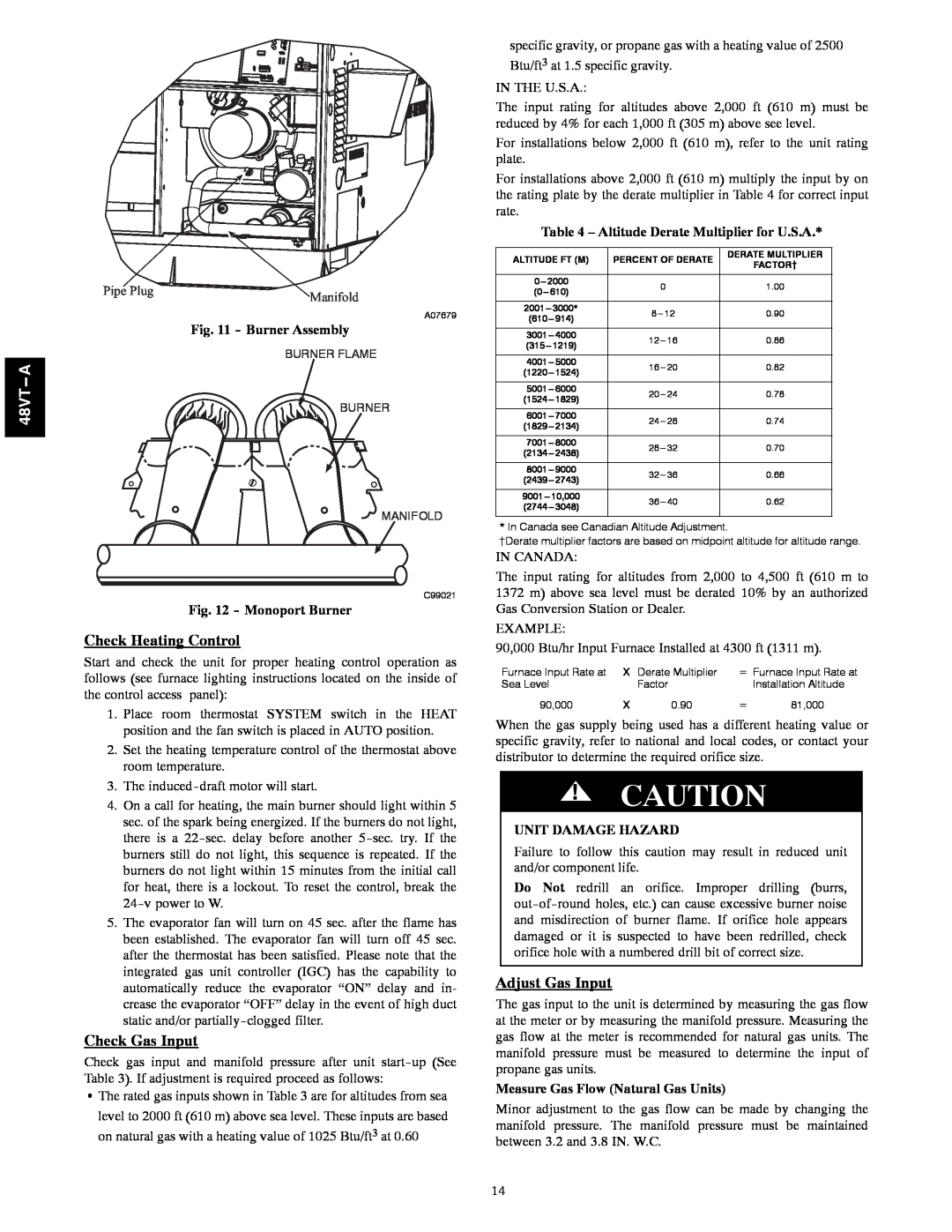
Pipe Plug | Manifold |
|
A07679
Fig. 11 - Burner Assembly
BURNER FLAME
BURNER
MANIFOLD
C99021
Fig. 12 - Monoport Burner
Check Heating Control
Start and check the unit for proper heating control operation as follows (see furnace lighting instructions located on the inside of the control access panel):
1.Place room thermostat SYSTEM switch in the HEAT position and the fan switch is placed in AUTO position.
2.Set the heating temperature control of the thermostat above room temperature.
3.The
4.On a call for heating, the main burner should light within 5 sec. of the spark being energized. If the burners do not light, there is a
5.The evaporator fan will turn on 45 sec. after the flame has been established. The evaporator fan will turn off 45 sec. after the thermostat has been satisfied. Please note that the integrated gas unit controller (IGC) has the capability to automatically reduce the evaporator “ON” delay and in- crease the evaporator “OFF” delay in the event of high duct static and/or
Check Gas Input
Check gas input and manifold pressure after unit
SThe rated gas inputs shown in Table 3 are for altitudes from sea level to 2000 ft (610 m) above sea level. These inputs are based on natural gas with a heating value of 1025 Btu/ft3 at 0.60
specific gravity, or propane gas with a heating value of 2500 Btu/ft3 at 1.5 specific gravity.
IN THE U.S.A.:
The input rating for altitudes above 2,000 ft (610 m) must be reduced by 4% for each 1,000 ft (305 m) above see level.
For installations below 2,000 ft (610 m), refer to the unit rating plate.
For installations above 2,000 ft (610 m) multiply the input by on the rating plate by the derate multiplier in Table 4 for correct input rate.
Table 4 – Altitude Derate Multiplier for U.S.A.*
ALTITUDE FT (M) | PERCENT OF DERATE | DERATE MULTIPLIER | ||
FACTOR{ | ||||
|
|
| ||
|
|
| ||
0 | 1.00 | |||
|
| |||
|
|
| ||
0.90 | ||||
(610 | ||||
|
| |||
|
|
|
| |
3001 | 0.86 | |||
|
| |||
|
|
|
| |
4001 | 0.82 | |||
(1220 | ||||
|
| |||
|
|
|
| |
5001 | 0.78 | |||
(1524 | ||||
|
| |||
|
|
|
| |
6001 | 0.74 | |||
(1829 | ||||
|
| |||
|
|
|
| |
7001 | 0.70 | |||
(2134 | ||||
|
| |||
|
|
|
| |
8001 | 0.66 | |||
(2439 | ||||
|
| |||
|
|
| ||
0.62 | ||||
(2744 | ||||
|
| |||
|
|
|
| |
* In Canada see Canadian Altitude Adjustment.
{Derate multiplier factors are based on midpoint altitude for altitude range.
IN CANADA:
The input rating for altitudes from 2,000 to 4,500 ft (610 m to 1372 m) above sea level must be derated 10% by an authorized Gas Conversion Station or Dealer.
EXAMPLE:
90,000 Btu/hr Input Furnace Installed at 4300 ft (1311 m).
Furnace Input Rate at | X | Derate Multiplier | = | Furnace Input Rate at |
Sea Level |
| Factor |
| Installation Altitude |
90,000 | X | 0.90 | = | 81,000 |
When the gas supply being used has a different heating value or specific gravity, refer to national and local codes, or contact your distributor to determine the required orifice size.
!CAUTION
UNIT DAMAGE HAZARD
Failure to follow this caution may result in reduced unit and/or component life.
Do Not redrill an orifice. Improper drilling (burrs,
Adjust Gas Input
The gas input to the unit is determined by measuring the gas flow at the meter or by measuring the manifold pressure. Measuring the gas flow at the meter is recommended for natural gas units. The manifold pressure must be measured to determine the input of propane gas units.
Measure Gas Flow (Natural Gas Units)
Minor adjustment to the gas flow can be made by changing the manifold pressure. The manifold pressure must be maintained between 3.2 and 3.8 IN. W.C.
14
